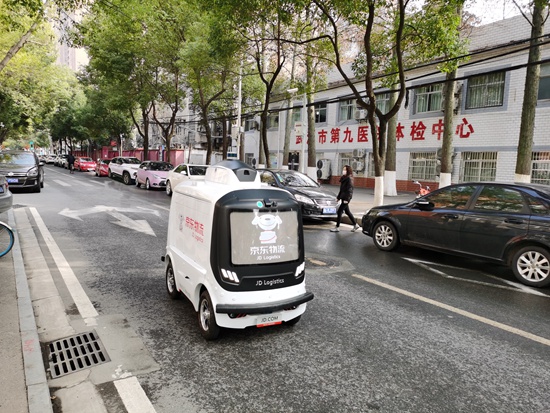

With China's digital economy continuing to boost consumption, the average daily number of parcels on major e-commerce platforms has been rising rapidly and distribution networks are starting to be upgraded.

A robot delivering parcels in Wuhan. (Photo/People's Daily Online)
By the end of March, the daily average number of packages on these platforms was about 50 million; at the end of May, the number had topped 65 million, according to data from Pinduoduo, a Chinese e-commerce
platform.
Thanks to Pinduoduo's advantages in promoting the sales of agricultural products, more than 2,000 merchants in Mengzi of Southwest China's Yunnan province have made use of the platform in the past three or four years. Fresh agricultural products grown in Mengzi can now be distributed directly to the country on the same day.
During the epidemic, Chinese e-commerce giant Meituan completed 56.2 million orders to hospitals across the country and recruited 791,500 deliverymen, who delivered daily necessities such as rice, noodles, grain, oil and medicine to customers.
These deliverymen are supported by the "minute-level" distribution network set up by Meituan in 2,800 cities and more than 10,000 distribution stations across the country.
Since the beginning of the year, e-commerce platforms have begun to upgrade their distribution networks, creating more affordable distribution methods, and working to build "new infrastructure" facilities.
For instance, the distribution brand of Meituan has announced that it will upgrade its opening strategy, help 10 million stores digitally, provide 200,000 deep distribution solutions, and create 3 million new jobs.
 Fire brigade in Shanghai holds group wedding
Fire brigade in Shanghai holds group wedding Tourists enjoy ice sculptures in Datan Town, north China
Tourists enjoy ice sculptures in Datan Town, north China Sunset scenery of Dayan Pagoda in Xi'an
Sunset scenery of Dayan Pagoda in Xi'an Tourists have fun at scenic spot in Nanlong Town, NW China
Tourists have fun at scenic spot in Nanlong Town, NW China Harbin attracts tourists by making best use of ice in winter
Harbin attracts tourists by making best use of ice in winter In pics: FIS Alpine Ski Women's World Cup Slalom
In pics: FIS Alpine Ski Women's World Cup Slalom Black-necked cranes rest at reservoir in Lhunzhub County, Lhasa
Black-necked cranes rest at reservoir in Lhunzhub County, Lhasa China's FAST telescope will be available to foreign scientists in April
China's FAST telescope will be available to foreign scientists in April "She power" plays indispensable role in poverty alleviation
"She power" plays indispensable role in poverty alleviation Top 10 world news events of People's Daily in 2020
Top 10 world news events of People's Daily in 2020 Top 10 China news events of People's Daily in 2020
Top 10 China news events of People's Daily in 2020 Top 10 media buzzwords of 2020
Top 10 media buzzwords of 2020 Year-ender:10 major tourism stories of 2020
Year-ender:10 major tourism stories of 2020 No interference in Venezuelan issues
No interference in Venezuelan issues
 Biz prepares for trade spat
Biz prepares for trade spat
 Broadcasting Continent
Broadcasting Continent Australia wins Chinese CEOs as US loses
Australia wins Chinese CEOs as US loses